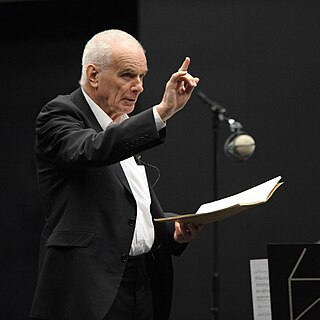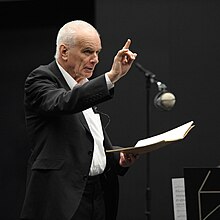
Sir Peter Maxwell Davies was a British composer and conductor, who in 2004 was made Master of the Queen's Music.

Wales has a strong and distinctive link with music. Singing is a significant part of Welsh national identity, and the country is traditionally referred to as "the land of song". This is a modern stereotype based on 19th century conceptions of Nonconformist choral music and 20th century male voice choirs, Eisteddfodau and arena singing, such as sporting events, but Wales has a history of music that has been used as a primary form of communication.
This is a summary of 2001 in music in the United Kingdom.
This is a summary of 2000 in music in the United Kingdom.
The Scottish Chamber Orchestra (SCO) is an Edinburgh-based UK chamber orchestra. One of Scotland's five National Performing Arts Companies, the SCO performs throughout Scotland, including annual tours of the Scottish Highlands and Islands and South of Scotland. The SCO appears regularly at the Edinburgh, East Neuk, St Magnus and Aldeburgh Festivals and The Proms. The SCO's international touring receives support from the Scottish Government. The SCO rehearses mainly at Edinburgh's Queen's Hall.
This is a summary of 1996 in music in the United Kingdom, including the official charts from that year.
Claude Vivier was a Quebecois composer.
Philip Grange is an English composer and academic.

the CIVIL warS: a tree is best measured when it is down is an opera created in the early 1980s by director Robert Wilson to music by Philip Glass, David Byrne, Gavin Bryars and others. The vast five-act work has never been performed whole.
Heinz Karl "Nali" Gruber, who styles himself HK Gruber professionally, is an Austrian composer, conductor, double bass player and singer. He is a leading figure of the so-called Third Viennese School.

Taverner is an opera with music and libretto by Peter Maxwell Davies. It is based on the life of the 16th-century English composer John Taverner, but in what Davies himself acknowledged was a non-realistic treatment. The gestation for the opera dated as far back as 1956 during Davies's years in Manchester, and continued when he went to Princeton University in 1962. Davies produced several instrumental works related to the opera during this gestation period, including the Points and Dances from 'Taverner' and the Second Fantasia on John Taverner's "In Nomine". Davies had completed the opera in 1968, but lost parts of the score in a fire at his Dorset cottage in 1969, which necessitated recomposition.
This is a summary of 1977 in music in the United Kingdom, including the official charts from that year.
David Horne is a Scottish composer, pianist, and teacher.

The Doctor of Myddfai is an opera in two acts composed by Peter Maxwell Davies to a libretto by David Pountney. The work premiered at the New Theatre in Cardiff on 5 June 1996, performed by the Welsh National Opera and conducted by Richard Armstrong. The libretto was adapted from an ancient Welsh legend related to the Lady of the Lake legend. The original tale is reinterpreted in terms of a mysterious disease, knowledge of which the authorities are trying to suppress. The opera takes place in a totalitarian society similar to that envisioned in Orwell's 1984, with a supreme ruler, mechanistic bureaucracy and endless war.

The Symphony No. 2 by Peter Maxwell Davies was commissioned by the Boston Symphony Orchestra in celebration of its centenary, and was composed in 1980. Seiji Ozawa conducted the world premiere with the BSO on 26 February 1981 at Symphony Hall, Boston.

The Symphony No. 6 by Peter Maxwell Davies was composed in Hoy during the first half of 1996, and was premiered on 22 June of the same year in the Phoenix Cinema, Kirkwall, as part of the twentieth St Magnus Festival, Orkney, by the Royal Philharmonic Orchestra conducted by the composer. The work was written with specific members of the RPO in mind, and is dedicated to the memory of the poet George Mackay Brown, who died on the day the symphony was completed.

The Symphony No. 3 by Peter Maxwell Davies was composed in 1984 on a commission from the BBC Philharmonic, who gave the world premiere on 19 February 1985, at the Free Trade Hall in Manchester, with Edward Downes conducting.

The Symphony No. 4 by Peter Maxwell Davies was commissioned for the Scottish Chamber Orchestra by Christian Salvesen plc and composed in 1989. It is dedicated to the memory of the violinist John Tunnell, who had been leader of the orchestra, and was premiered at the Royal Albert Hall on a BBC Promenade Concert on 10 September 1989, with the composer conducting the Scottish Chamber Orchestra.

The Symphony No. 5 was composed by Peter Maxwell Davies in 1994 on commission from the Philharmonia Orchestra, who gave the world premiere under the composer’s direction at a BBC Promenade concert on 9 August 1994, at the Royal Albert Hall in London.

The Symphony No. 1 by Peter Maxwell Davies was composed between 1973 and 1976, and is dedicated to Sir William Glock, "as a mark of friendship and of appreciation of his work for contemporary music in his years as music controller at the B.B.C.". It was commissioned by the Philharmonia Orchestra, which gave the premiere of the symphony at the Royal Festival Hall, London, on 2 February 1978, with Simon Rattle conducting.




